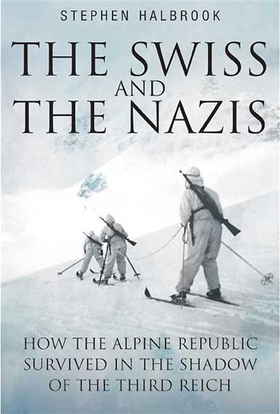
Lägg till önskelistan
Swiss and the Nazis e-bok
Pris
75 kr
While surrounded by the Axis powers in World War II, Switzerland remained democratic and, unlike most of Europe, never succumbed to the siren songs and threats of the Nazi goliath.
This book tells the story with emphasis on two voices rarely heard. One voice is that of scores of Swiss who lived in those dark years, told through oral history. They mobilized to defend the country, labored on the farms, and helped refugees. The other voice is that of Nazi Intelligence, those who spied on the S...
E-Bok
75 kr
Pris
Förlag
Casemate
Utgiven
15 Februari 2021
Längd
352 sidor
Genrer
Historia & Arkeologi, Fackböcker
Språk
English
Format
epub
Kopieringsskydd
Vattenmärkt
ISBN
9781612000299
While surrounded by the Axis powers in World War II, Switzerland remained democratic and, unlike most of Europe, never succumbed to the siren songs and threats of the Nazi goliath.
This book tells the story with emphasis on two voices rarely heard. One voice is that of scores of Swiss who lived in those dark years, told through oral history. They mobilized to defend the country, labored on the farms, and helped refugees. The other voice is that of Nazi Intelligence, those who spied on the Swiss and planned subversion and invasion. Exhaustive documents from the German military archives reveals a chilling rendition of attack plans which would be dissuaded in part by Switzerland's armed populace and Alpine defenses.
Laced with unique maps and photos, the book is organized into four units. The first, A War of Words and Nerves, depicts how the Swiss mobilized an active "spiritual defense" of their country. Chapters describe jokes and slurs the Swiss devised to characterize the "Nazi pigs," the use of the press and cabaret as weapons against totalitarianism, and the role of Swiss newsreels in building the spirit of resistance. German prewar subversion plans are also revealed.
The second unit, To Resist to the Death, concerns military preparations. Swiss soldiers recall an epoch when every day could have been "the day" when all hell would break lose and they would meet the enemy. Blitzkrieg plans against Switzerland devised by the German Wehrmacht in 1940 are described in detail. Switzerland was an armed camp with countless fortifications, against which the Axis could have attempted access with extreme costs in blood. In Switzerland, Jews -- like all other citizens -- were in arms, and Jewish officers served in the highest levels of the Swiss army.
Struggle for Survival: Food, Fuel and Fear, the third unit, presents oral histories of daily life during the war with its shortages, alarms, and rumors. The role of women in the military and the economy are probed. A chapter on the refugee crisis investigates whether Swiss officials played a role in Germany's adoption of the "J" stamp on Jewish passports, how Switzerland became a lifeboat for refugees, and how asylum policies were liberalized as the persecution of Jews escalated.
Espionage and Subversion, the fourth and final unit, covers strategic issues and intelligence activities. German attack plans and bickering in the Gestapo about who would rule a conquered Switzerland persisted. One chapter focuses on Davos, where the Swiss struggled against a Fifth Column and which became a safe haven for American airmen whose crippled bombers made it to Swiss territory. The last chapter profiles Switzerland as America's window on the Reich -- how Allen Dulles and his OSS spied on the Nazis, at times with help from Swiss Intelligence.
Halbrook's other books include the award-winning Target Switzerland: Swiss Armed Neutrality in World War II, which was published in five languages.




